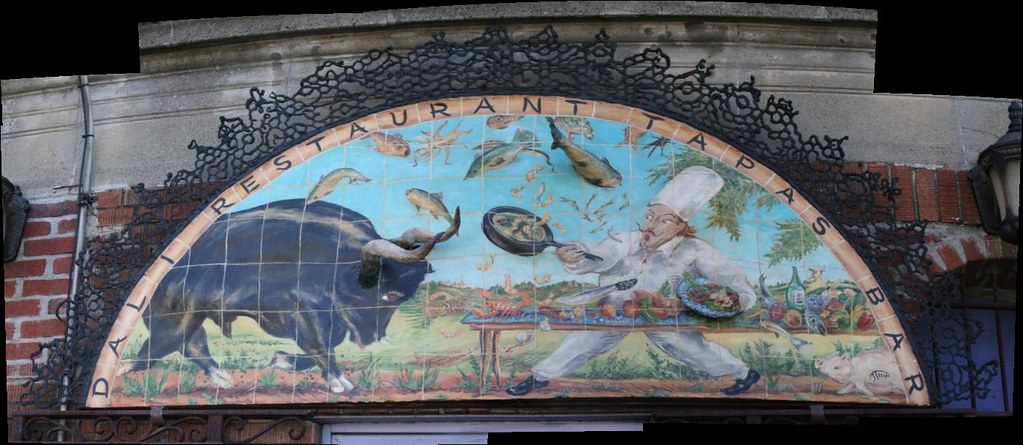For Tibetans' independent movement, most Taiwanese support and sympathize Tibetans, and many people changed their twitter profile figure to
the flag of Tibet which represents Tibetan independent movement.
'Free Tibet' (Photo courtesy of
skydaughter.)
Many artists, writers, musicians, and social movement participants held
'Bringing love to Tibet' to pray for Tibetans:
多年來,台灣年輕志工的身影,經常出現在全球各地需要協助的所在。如今,與台灣只隔著中國的西藏,受到暴力鎮壓,台灣年輕人感同身受,決心挺身聲援,用音樂、詩歌聲援西藏。
Young volunteers from Taiwan have worked overseas wherever help is needed. Now Tibet is violently oppressed by China, and these young Taiwanese identify ourselves with the Tibetans. We decided to support Tibetans, by our music and poems.
Compared to other countries, Tibetans' independent movement has a very special meaning for Taiwan. Most of the discussions are based on empathy, because Taiwan and Tibet are both threatened and manipulated by China.
Terry said,
我個人很畏懼這個國家(中國)過往的殘酷紀錄,我高中時爆發的天安門事件,根據現在許多的證據顯示,當年天安門事件的確出動了軍隊鎮壓,並且開槍殺死了許多人民,對於這樣一個雙手沾滿血腥的鄰居,我只用戒慎恐懼來形容。
I am afraid of this country (China) due to its past records of cruelty. When I was in high school, there was
Tiananmen Square protests. A lot of evidence shows that there was military oppression in Tiananmen square, and many people were killed. Facing this neighbor with blood in its hand, I am afraid and alert.
我身邊有許多人說:我們有中文語言的優勢,我們不應該自絕跟這個鄰居做生意,讓自己經濟繁榮的機會。但如果這樣的經濟繁榮機會,最後卻讓自己陷入被鎮壓、同時無法擁有民主自由的現在,我會寧可選擇保守一點,日子苦一點無所謂,但我想要高興談論、自由呼吸自由存在。
Many people said that we should not put restrains on ourselves and give up the opportunity of prosperity by doing business with this neighbor since we have the niche of using the same language. However, if the opportunity of prosperity comes with oppression and loss of democracy and freedom, I will choose to be conservative. Living a poor life is all right, if I can speak, breath, and live happily and freely.
Some people reflected Taiwan's history and compared its own oppressed past with Tibetans' independent movement.
Judie said, Tibetans are in their
228 Massacre.
圖博人正在經歷他們的二二八,與外來統治者展開艱難的鬥爭。[...]他們的行動被統治者誤解、汙衊,無辜者的血繼續流,傷痕正在加深.......
Tibetans are experiencing their 228 Massacre, making a difficult stand against the foreign ruler.[...] Their independent movement is misunderstood and slandered. The blood from these innocent people keeps running and the hurt is deepened.
Many people criticized the mass media in Taiwan.
Jas took blocking the news about Tibet for example and said, because the sources and gatekeepers are different, this independent movement is reported differently.
(中國)過去稱六四天安門為一小撮人,稱台獨為一小撮人,如今又同樣以一小撮人來指涉被迫害的西藏人。
(China) said there were only 'a few' people joining
Tiananmen Square protests and there are only 'a few' people supporting the independence of Taiwan, and now they referred to the oppressed Tibetans as 'a few' again.
in Germany compared the news about Tibet in Taiwan and Germany, and said the news is obviously less in Taiwan than in Germany.
一個國家動用軍警武力殺害抗議的人民,是對人權最赤裸的摧殘與蔑視;[...]我想這件事的歷史重要性不會在六四天安門之下,但很遺憾的是,國內的主要媒體的新聞處理淡很多,跟德國所有全國性的媒體統統頭版處理差別實在很大。
A country that uses its military to kill the protesters is depreciating and ruining human right.[...] I think this independent movement will be as important as
Tiananmen Square protests. However, I am sorry to see the major media in Taiwan did not take it seriously, which is very different from how Germany media treats it.
in Beijing talked about the information blockage in China.
有人問我北京人對西藏事件的看法,在這種情形下,北京人連西藏發生了什麼事恐怕都不知道,知道的也就是一面倒的聲音,若干藏民暴徒挑起暴亂,傷害無辜漢族百姓,達賴在背後策動,目的是要搗亂奧運,爭取獨立。這就是所有來自中國媒體的新聞角度,在這種情形下,北京一般民眾,還能有什麼看法?
Some people asked me how people in Beijing view this Tibetan independent movement. Under this condition, most people in Beijing don't know what happens in Tibet. If some of them know, they only know that some Tibetans evoked violence and hurt innocent Han people, and Dalai Lama have orchestrated it to ruin the Olympic Games in Beijing and for their independence. This is what mass media in China said. In this condition, what do you think people in Beijing can comment?
Although China government blocks the information, due to the advance of technology, some people in China tries to use instant messanger and twitter to see people's comment about the protest in Tibet, even though they are confused or unhappy.
A message in zola may show some people's opinions:
西藏現在需要的,是健康的發展和對藏文化的保護,以及西藏問題的和平解決,罈子裡這些喊打喊殺的兄弟,如果你們有一個真正的藏族朋友,也許你們就不會說那些話了。
What Tibet needs is healthy development, protecting their culture, and solving political issues peacefully. For whoever says we should kill and oppress, if you have Tibetan friends, you will not say so any more.
Annpo asked Chinese friends through twitter, and one of them who has experience of working in Tibet said:
藏区的生活的确改善很大,起码比周边的国家都不错,这是应该看到的。但[...]生活好了,就会满足吗?[...]政府免费让他们读书,却用的是汉族课本。[...]藏族人对青藏铁路并不完全是支持的。而在拉萨日益繁华的时候,我那些老藏族的邻居却一个个都搬走了,这些难道还不够说明问题?
The life condition in Tibet does improve a lot. We can see the life in Tibet now is better compared to its neighbors. However, [...] can we satisfy people only by making their life better? [...] The government affords free education, but the textbooks are Han's textbooks. [...] Not all Tibetans support the
Qinghai-Tibet Railway. When Lhasa becomes prosperous, my Tibetan friends keep moving out. Can't these observations explain the problem in Tibet?
There are other people caring about Tibet. Reiw in Hong Kong made a
detail analysis and zola shared
the summary of the news. Chao-Chen Lin, a reporter interviewing Dalai Lama and many Tibetans before,
explained the problem of Tibet is due to the failure of conversation between Dalai Lama and Chinese government, and the development brought by China government that destroys their culture.
Acknowledgment:
A-po made this summary first, and then I-Fan edited and translated it into English.





